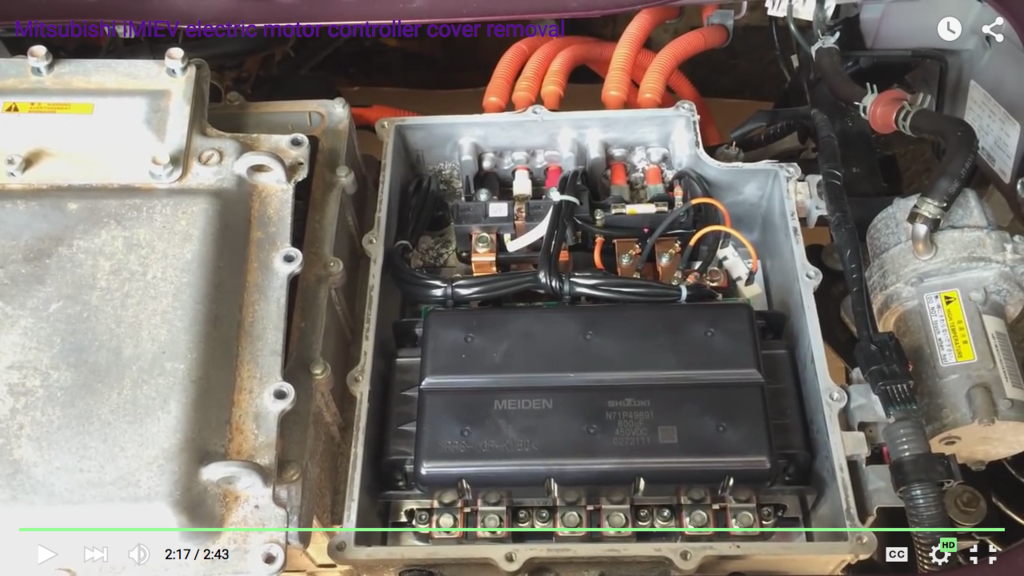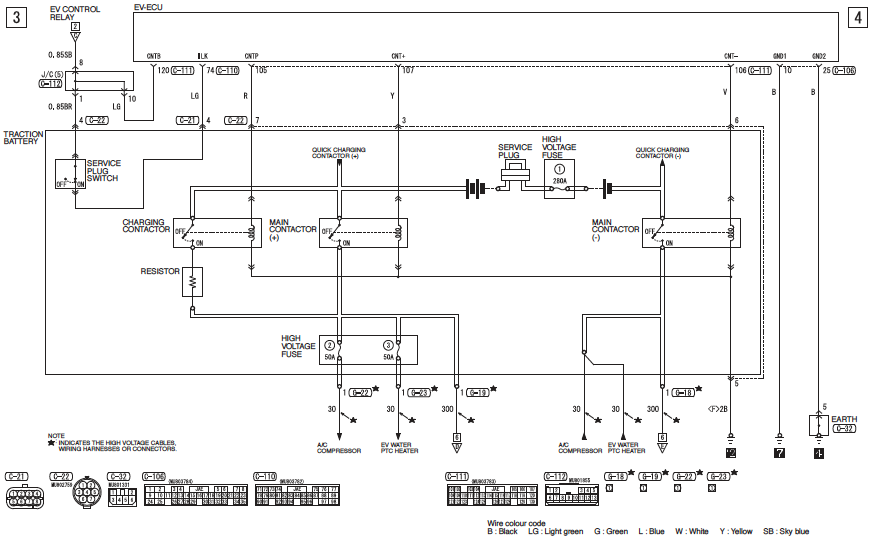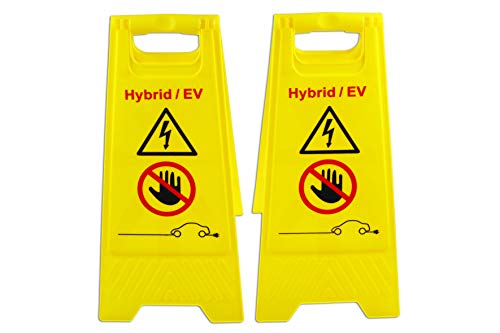Today I received that pesky 20A 400V fuse under the inverter inspection cover that pops when there is a charger OR DCDC fault. It is Mitsubishi part #9499A656. Thanks go out to Concord Mitsubishi of Concord, CA for shipping it directly to me. MR BEAN is back to 100%
You are using an out of date browser. It may not display this or other websites correctly.
You should upgrade or use an alternative browser.
You should upgrade or use an alternative browser.
Not Charging. Main Inverter Fuse blown
- Thread starter iDriver
- Start date

Help Support Mitsubishi i-MiEV Forum:
This site may earn a commission from merchant affiliate
links, including eBay, Amazon, and others.
PV1
Well-known member
KiEV, the main positive contactor won't engage until the condenser is at pack voltage. Since the condenser tops out 12 volts shy of pack voltage, the car errors and never connects the pack.
It appears that the condenser discharges really quickly after the flag was set, which may point to an undesired load somewhere in the system. In my experience, I usually hear a clunk 5 seconds after powering the car off, which I believe is the negative main contactor dropping out after condenser discharge is complete. This load would cause the condenser to not charge quickly enough given a fixed current source (the pre-charge resistor), so it times out before fully charging.
Lic, just to verify, is the fuse feeding the DC-DC converter blown?
It appears that the condenser discharges really quickly after the flag was set, which may point to an undesired load somewhere in the system. In my experience, I usually hear a clunk 5 seconds after powering the car off, which I believe is the negative main contactor dropping out after condenser discharge is complete. This load would cause the condenser to not charge quickly enough given a fixed current source (the pre-charge resistor), so it times out before fully charging.
Lic, just to verify, is the fuse feeding the DC-DC converter blown?
No. If car starts - it is working fine. It takes charge, it drives well.PV1 said:Lic, just to verify, is the fuse feeding the DC-DC converter blown?
PeterJohn1
New member
- Joined
- Oct 12, 2018
- Messages
- 1
Hi..i think it is really odd that it blows the fuse to the inverter while charging--i wouldn't have guessed that power was applied to the inverter at that time, can't see any reason why it would be needed or desired.
pcb assembly process
pcb assembly process
PeterJohn1 said:Hi..i think it is really odd that it blows the fuse to the inverter while charging--i wouldn't have guessed that power was applied to the inverter at that time, can't see any reason why it would be needed or desired.
That 20 amp fuse located in the inverter enclosure actually serves as both the charger output and the DC-DC input fuse.
I got p1a15 code when i was in Chdademo charger and started fast charge.. yea it wont let car to go Ready mode.
I reboted 12v battery there hope DTC to clear but nono.. instead when reset 12v battery i got about 15% more SOC and 15km more range. Even car didnt charge at all. Soc meter started with bar to bar more. So it did reset also
. Just wondering how it gived 15% more soc?
Do u think i might need ask maintenance just reprogram ECU to not get p1a15 active after every DTC clear?
I reboted 12v battery there hope DTC to clear but nono.. instead when reset 12v battery i got about 15% more SOC and 15km more range. Even car didnt charge at all. Soc meter started with bar to bar more. So it did reset also
. Just wondering how it gived 15% more soc?
Do u think i might need ask maintenance just reprogram ECU to not get p1a15 active after every DTC clear?

$150.00
$299.99
EP Home Smart Electric Vehicle Charger, 40 Amp Level 2 EV Charger, NEMA14-50 Wall Indoor/Outdoor Electric Car Charging Station, 240V, 25 Ft Cable
Energy Pro Cable

$29.99
Car Tissue Holder for Mitsubishi i-MiEV 2009-2020, Car Napkin Cover for Car PU Leather Car Visor/Backseat Organizer Hanging Paper Towel Clip Car Accessories,Orange-1
hongchuangbaihuoshangdiangerenduzi

$15.99
Built Industrial Adjustable 3 Jaw Oil Filter Wrench with Adapter and Plier Tool Set for Auto Care
Infinite-Commerce

$28.99
FIPOISA Car Rear Bumper Protector for Mitsubishi I-Miev, Carbon Fiber Trunk Door Sill Protection Strip Sticker, Trunk Door Entry Guards Plate Decorative Accessories
yuanpingshizhanghongyushangmaoyouxiangongsi

$26.99
KISHACZ 4 PCS Car Door Lock Cover for Mitsubishi i-MiEV 2009-2020, Car Door Latch Lock Protective Cover, Door Latch Lock Cover, Door Latch Guard Car Decorative Accessories,B Black
Yuanpingshilixiuhanshangmaoyouxiangongsi
So after long time I returned to repair car. All those time car was sitting on driveway. I tried to remove error and start car but after about 30 attempts I was not able to get ready. So in summer I left car in state in which car was starting successfully time to time, but right now it does not show ready at all. Same error, same problem - condenser can't charge in right time. It is strange why car doesn't show ready at all. Big difference is only temperature between summer and this time. I think I will try to open MCU and look condenser, but I am not sure what exactly to check. Any suggestions?Lic said:i have hyperion 1420 charger. I tested my battery and it showed good capacity and it can provide good current without big voltage dropping, plus i measured internal resistance and it was fine (i don't remember exact numbers). so i am sure in my battery.
so i looked car by launch tester and only serious error was P1A15. i erased it and car showed ready. I tried to switch it on and off several times - it was fine. i tried to make small ride and after switch off and on car showed same error again and doesn't show ready. i tried to find what is make car to show error and found that condenser charging timeout flag is on every time when car shows error P1A15. it is look like most likely car will show ready if i did car small rest before. same problem with same error when i tried to charge car. i tried to use other 12v battery from my other car and everything was the same - it is easy to get ready if i didn't use car some time and it starts to show error after even small ride. when car is show ready condenser voltage is 340v and real battery voltage is 350v.
i did small video about how reacts voltages and contactors positions when i am trying to switch on car and it doesn't start. i will show it if somebody interesting.
PS I didn't use car from Jun 17. Before car had capacity around 36ah. Right now as I can see it has capacity in BMU settings only 29ah. I left car with around 67% SOC. For me it is strange that car lost so much capacity when it was just sitting on driveway.
coulomb
Well-known member
I would think it's not likely to be the capacitor ("condenser" is an ancient term for capacitor); it would have to have *extra* capacitance to cause this problem. [ Edit: Sigh. I contradict myself below; it could also be that the capacitor has very high leakage, but that seems unlikely. ] I think it's more likely to be one ofLic said:I think I will try to open MCU and look condenser, but I am not sure what exactly to check. Any suggestions?
- Pre-charge resistor
- Pre-charge or one of the main contactors (positive or negative)
- Something causing extra load on the high voltage side, e.g. blown components in the MCU, or more likely given the history we've seen, the On Board Charrger. In particular, it might be those small capacitors in the OBC that blow so frequently. If the DC-DC and OBC 20 A fuse hasn't blown but those capacitors are shorted, then you won't be able to achieve ready.
- The auxiliary battery, especially since it's had ample time to discharge with all the little loads that cars have, and we know that a weak auxiliary battery can cause all sorts of problems. In particular, it might not be able to pull in three contactors, if it's really weak.

The capacitor is the large black thing with "MEIDEN" written on it. Unless it's melted or otherwise visibly deformed, I doubt that you'll be able to determine much by looking at it, unfortunately.
Only the auxiliary battery is easy to test/fix. Give it a charge with a 12 V charrger, since the DC-DC can't charge if from the traction battery without achieving ready (battery connected to HV circuits, such as DC-DC input). If it's older than say 3 years, replace it. If none of that helps, you'll need to try and measure the drain on the high voltage bus, without electroplating yourself. How confident are you with this sort of thing? I've heard of people activating contactors manually and measuring the resistance of the pre-charge resistor, but this is far from trivial if you're not set up for that sort of thing, and of course one end of the resistor you'd be measuring is connected to traction battery positive.
12v is fine for sure. I have actually 3 around me. One of them 6 months old original mitsubishi i-miev battery. It is fully charged and checked for capacity and ability to provide good current without big voltage drop.
I am fine to work with hi voltage battery. I have a lot of experience with repair and modifying my 116V electric scooter.
I don't think there is a problem with extra load on hi voltage side. When dealer kind "repaired" car - I drove and charged car without any problems. Car showed regular 0.4A consumption from big battery on parking shift in ready mode. It was nothing unusual except it doesn't show ready after restart.
So I think the same - I need some how check precharge resistor and main contactors. Is there information how manually switch on main contactors?
I am fine to work with hi voltage battery. I have a lot of experience with repair and modifying my 116V electric scooter.
I don't think there is a problem with extra load on hi voltage side. When dealer kind "repaired" car - I drove and charged car without any problems. Car showed regular 0.4A consumption from big battery on parking shift in ready mode. It was nothing unusual except it doesn't show ready after restart.
So I think the same - I need some how check precharge resistor and main contactors. Is there information how manually switch on main contactors?
coulomb
Well-known member
Find the original of the below on http://mmc-manuals.ru/manuals/i-miev/online/Service_Manual/2013/index_M1.htm .Lic said:Is there information how manually switch on main contactors?

From the Troubleshooting and repair for On-board Charger (OBC), DC-DC Converter topic, first page.
You will then have the pinouts for the connectors, just energise what you need with a 12 V supply or battery, with the service plugs disconnected. I have no idea how practical this is to do with a car on the ground. See also Imiev repair - precharge resistor (Australian Electric Vehicle Association forum). I don't think that the contactor coils are polarity sensitive (e.g. economiser present, or catch diode), but perhaps it's worth checking.
i think your contactors are damaged from back in April 2018 (see page 4) when you tried to start and then drove the car with a loose negative terminal on the Aux battery. The contactor coil was de-energized while under load (current was flowing thru the contact junction) and arcing occurred across the contact gap. Now the surface has been damaged and the resistance of the junction has been affected.
So this is manifest as an intermittent fault due to arcing debris on the contacts: sometimes it will make a good contact and you get READY; sometimes it makes a poor contact and you get ~10V drop across the contacts, slow charging of the MCU condenser, car will not start and it throws the P1A15 DTC.
This fault has progressively gotten worse. Back then you could sometimes get READY, now it is so bad that you will rarely get it to start.
So this is manifest as an intermittent fault due to arcing debris on the contacts: sometimes it will make a good contact and you get READY; sometimes it makes a poor contact and you get ~10V drop across the contacts, slow charging of the MCU condenser, car will not start and it throws the P1A15 DTC.
This fault has progressively gotten worse. Back then you could sometimes get READY, now it is so bad that you will rarely get it to start.
Maybe the pack is under warranty? If so then pursue replacement; if not then it seems to me that the contactors will need to be replaced.
Yes, battery is under warranty, but I did already one attempt to show it to dealer and as you know dealer was not so good in finding out what is problem and how to solve it. Should I try one more time? How I can prove that problem in pack?
Do you have a voltmeter? You never responded about the test i mentioned on page 6:
"One way to check would be put a voltmeter on the EV-ECU line that commands Main[+] and see if it goes to 12V when trying to start. EVECU is under the rear seat, yellow wire in connector 111, terminal 107, check voltage between here and ground/chassis."
Also use a voltmeter to measure the open circuit voltage of the Aux battery, then measure it with the key turned to ON and START. Post the data, orr take a picture of the reading and post that.
Check and replace the low-voltage supply relays that provide power for the EVECU and BMU. These may have been damaged by a loose negative terminal also, although if their supply is low then it should trigger a DTC. But the Main(+) contactor coil is driven by current from the EVECU thru the tiny supply relay.
One other test: if the Main(+) is not coming on, then it seems that the car would not be able to charge; Does the car charge anymore?
What DTCs are showing up on your scanner?
"One way to check would be put a voltmeter on the EV-ECU line that commands Main[+] and see if it goes to 12V when trying to start. EVECU is under the rear seat, yellow wire in connector 111, terminal 107, check voltage between here and ground/chassis."
Also use a voltmeter to measure the open circuit voltage of the Aux battery, then measure it with the key turned to ON and START. Post the data, orr take a picture of the reading and post that.
Check and replace the low-voltage supply relays that provide power for the EVECU and BMU. These may have been damaged by a loose negative terminal also, although if their supply is low then it should trigger a DTC. But the Main(+) contactor coil is driven by current from the EVECU thru the tiny supply relay.
One other test: if the Main(+) is not coming on, then it seems that the car would not be able to charge; Does the car charge anymore?
What DTCs are showing up on your scanner?
It does not make sense to check main(+) contactor because EV-ECU will attempt to use it only if condenser will get full voltage from battery through precharge resistor. In my case car stops this processes. If EV-ECU will apply main(+) contactor before getting full battery voltage on condenser - it could be small "badaboom".
Same thing said PV1 earlier
I will do measure voltage on 12v battery when I try to switch on car. I checked it before and didn't see anything unusual but I don't have exact numbers.
Car doesn't charge right now. And it is obvious - same problem, condenser charge timeout flag.
Right now I am getting only one DTC - P1A15 is High-Voltage System Error #1
Same thing said PV1 earlier
PV1 said:KiEV, the main positive contactor won't engage until the condenser is at pack voltage. Since the condenser tops out 12 volts shy of pack voltage, the car errors and never connects the pack.
Do you know where located those relays?kiev said:Check and replace the low-voltage supply relays that provide power for the EVECU and BMU. These may have been damaged by a loose negative terminal also, although if their supply is low then it should trigger a DTC. But the Main(+) contactor coil is driven by current from the EVECU thru the tiny supply relay.
I will do measure voltage on 12v battery when I try to switch on car. I checked it before and didn't see anything unusual but I don't have exact numbers.
Car doesn't charge right now. And it is obvious - same problem, condenser charge timeout flag.
Right now I am getting only one DTC - P1A15 is High-Voltage System Error #1
Start your own thread instead of glomming on to someone else's.
If you won't take the measurements and collect the data that i recommend or request, then i can't waste anymore time trying to help.
Maybe PV1 can solve your problem since you seem to think that he knows more about troubleshooting than i do.
If you won't take the measurements and collect the data that i recommend or request, then i can't waste anymore time trying to help.
Maybe PV1 can solve your problem since you seem to think that he knows more about troubleshooting than i do.
coulomb
Well-known member
From the Troubleshooting thread:Lic said:Do you know where located those relays?
http://mmc-manuals.ru/manuals/i-miev/online/Service_Manual/2012/54/html/M154950210002800ENG.HTM
I don't see why you tell me this?kiev said:If you won't take the measurements and collect the data that i recommend or request, then i can't waste anymore time trying to help.
Maybe PV1 can solve your problem since you seem to think that he knows more about troubleshooting than i do.
You can check on working car - main (+) connects only after getting on condenser full battery voltage.
Similar threads
- Replies
- 9
- Views
- 751
- Replies
- 11
- Views
- 1K
- Replies
- 18
- Views
- 2K
- Replies
- 9
- Views
- 387



























